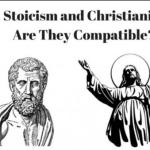Over the past few years there has been a renewal of popular interest in the philosophy of the Stoics. While it could be attributed to the publication of works such as Lawrence Becker’s New Stoicism or Pierre Hadot’s The Inner Citadel: The Meditations of Marcus Aurelius, both published in 1998, I attribute the revival to the commercial success of Ryan Holiday’s The Obstacle is the Way. Building on that success, Holiday continues to write books, create a journal for followers, and even sells stoic mementos on his website, The Daily Stoic. Predictably, his success has led to others joining in the commercialization of stoicism. Today you can easily find podcasts, e-classes, Mastermind groups and even a Stoicon to cap off Stoic Week!
This wave of renewed interest in stoicism has once again sparked a debate about the compatibility of the pagan philosophy of stoicism and Christianity. Books such as C. Kavin Rowe’s One True Life: The Stoics and Early Christians as Rival Traditions and Kevin Yost’s The Porch and The Cross: Ancient Stoic Wisdom for Modern Christian Living both take up this debate. Not surprising, Rowe and Yost come to vastly different conclusions, illustrating that a debate that has gone on for over 2000 years continues as strong as ever. As most modern stoics are atheists, the debate is even more complicated.
You Haven’t Heard of Lipsius?

Yet I found one common link in the chain of stoic thought curiously absent in most of these current debates: not one mention of Justus Lipsius or the thinkers that sparked the Neostoic philosophy during the Renaissance. It surprised me because one can argue thinkers such as Lipsius, Guillaume du Vair, Joseph Hall, Pierre Charron and Franciscio Quevedo settled the debate centuries ago! They all agreed; while there were elements of stoicism that were not compatible with Christianity, there was a way to address it and utilize the philosophy for the aid of a Christian life.
It All Started in the Renaissance
This column will provide a look into the Neostoic philosophy of the Renaissance and consider both its compatibility with Christianity and perhaps more importantly, its utility to the Christian to aid in his walk with Christ. For as stoicism was born in a time of chaos in Athens, political corruption and wars, neostoicism was also born in a time of religious strife, political intrigue and civil wars! Just the situation 21st century Christians around the world face today.
Throughout Europe, the works of the classical stoic writers were rediscovered during the Renaissance. Scholars like Petrarch and Erasmus were also Christian humanists, excited to have the works of antiquity live again! Petrarch even made it known that he thought such “pagan literature” could be useful for the Christian. He wrote:
“While I know that many have become famous for piety without learning, at the same time I know of no one who has been prevented by literature from following the path of holiness.”
This is the spirit of this column. Through writing, I hope to increase my own understanding and thus be able to clearly present the philosophy of neostocism, My desire is to introduce readers to the primary sources above all, and to the works of selected learned scholars. I discovered these thinkers while working on my Phd, a path that unfortunately I continue on at present due to my own procrastination. I stumbled on the works on Rudolf Kirk, who had edited a trilogy of neostoic thought: Lipsius’s On Constancy, Du Vair’s The Moral Philosophie of the Stoicks and Bishop Joseph Hall’s Heaven Upon Earth and Characters of Vertues and Vices, I will also look to the work of Jason Saunders and John Sellars on Lipsius.
Of course, this venture will by necessity draw us into classical stoicism as well. Again, I will look at primary works of the Stoics themselves. Why read what others say about Seneca or Epictetus when we can read the direct works of the philosophers?
Of course, the question a potential reader of this column must ask themselves is clearly, “why should I care about neostoic philosophy? As a student of stoicism, I found this Renaissance philosophy intriguing originally due to its relative unknown status, even among a seemingly stoic revival. Yet the more I studied, the more interested I became as a Chrisitan, not simply a PhD student. Perhaps the modern Christian or person of faith might enjoy and learn from the neostoics just as countless numbers have from the classical Roman Stoics! These writings have blessed me in my Christian walk; it is my fervent hope you might become interested as well.
Join me on my journey…







